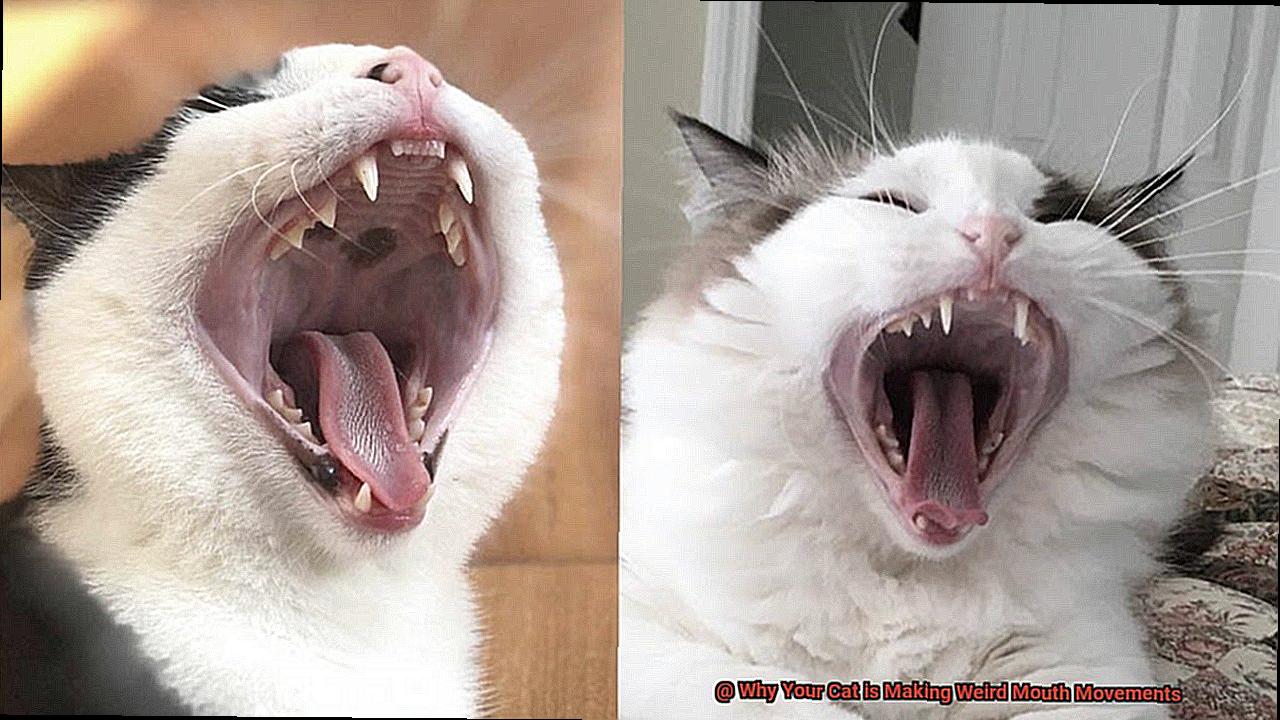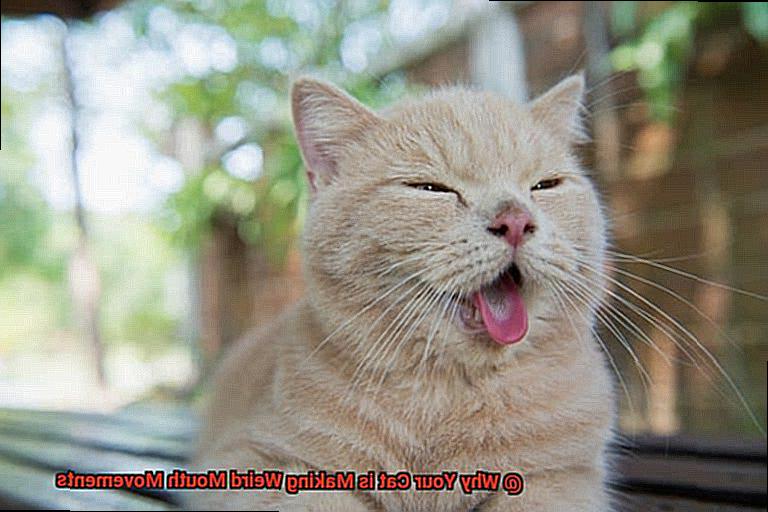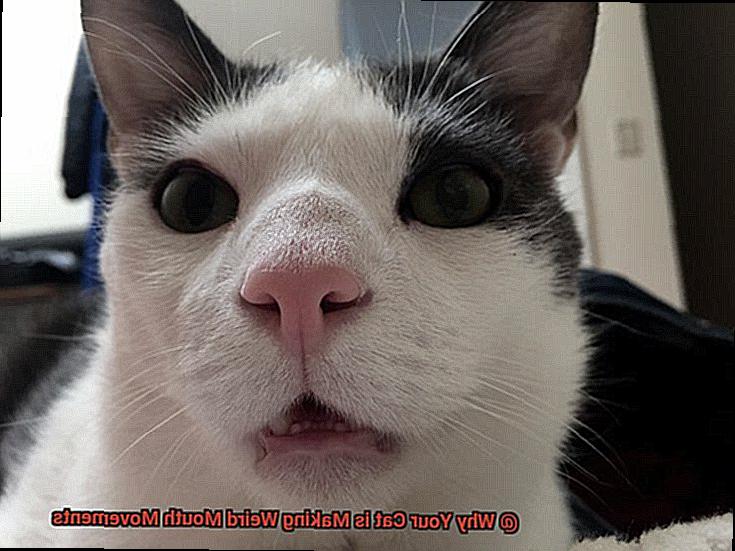Calling all cat enthusiasts. Have you ever noticed your furry friend making strange mouth movements? Maybe it looks like they’re chewing on something invisible or trying to spit out a hairball? Fear not, as this behavior is quite common among cats. In this blog post, we’ll explore the reasons behind these peculiar mannerisms.
But before we dive in, let’s address the elephant in the room: these mouth movements can be pretty hilarious. It’s hard not to chuckle when your kitty contorts their face into odd shapes. However, it’s important to remember that there could be an underlying medical issue causing these behaviors.
We’ll delve into possible causes such as dental problems, oral irritation, and allergic reactions. Plus, we’ll provide tips on how to treat and prevent these behaviors from happening again.
So, next time your feline friend starts making weird mouth movements, don’t dismiss it as just another quirk. Instead, pay attention and keep reading to learn about potential health issues and how to keep your cat’s oral health in tip-top shape.
What is a Cat’s Mouth Movement?
Cats are fascinating creatures, and their unique behaviors never fail to amaze us. One such behavior that often leaves cat owners puzzled is the strange mouth movements that their feline friends make. But fear not, as an expert on the subject, I am here to help you understand what your cat might be trying to communicate through these movements.
A cat’s mouth movement refers to the way in which their lips, tongue, and jaw move while they are communicating or eating. These movements can take many forms, including lip licking, teeth chattering, jaw trembling, and blepping. Each movement can signify different things depending on the context.

Let’s start with the chattering. Have you ever seen your cat open and close its mouth quickly, producing a clicking sound? This behavior is known as chattering and is often a sign of excitement or anticipation. It usually happens when a cat sees prey but cannot get to it. However, some experts believe that chattering could also be a sign of frustration or anxiety.
Another common mouth movement that cats make is called “blepping.” This action occurs when a cat sticks out its tongue slightly and leaves it there for a few seconds. Blepping is often a sign of relaxation or contentment. Cats may blep when they are feeling comfortable and happy, such as when they are lounging in their favorite spot.
But what if your cat is making strange mouth movements frequently? It could be a sign of discomfort or pain. Cats may lick their lips or chatter their teeth as a way to self-soothe when they are in pain or feeling anxious. If you notice your cat making these movements frequently, it may be worth taking them to the veterinarian to rule out any underlying health issues.
Dental issues can also cause weird mouth movements in cats. Cats can develop dental problems such as gum disease or tooth decay, which can make it difficult or painful for them to eat. In these cases, cats may show signs of discomfort by making strange mouth movements or avoiding certain types of food. Regular dental check-ups can help catch these issues early and prevent further complications.
So, a cat’s mouth movement can convey different messages depending on the context. Whether it’s excitement, relaxation, discomfort, or pain, paying attention to your cat’s mouth movements can provide valuable insight into their well-being.
Possible Reasons for Weird Mouth Movements in Cats
Cats are fascinating creatures that we love to watch and play with. However, sometimes our feline friends can exhibit strange behaviors that leave us scratching our heads. One such behavior is weird mouth movements, which can take many forms, including lip-licking, teeth chattering, and jaw trembling.
Here, we’ll explore the possible reasons why cats make these weird mouth movements. We’ll cover dental problems, infections, neurological issues, allergies, and behavioral issues. By understanding the causes of these behaviors, cat owners can provide their furry friends with the care and attention they need.
Dental Problems
Dental problems are one of the most common causes of weird mouth movements in cats. If your cat has a dental issue such as gum disease or a broken tooth, it may be experiencing pain or discomfort when eating or grooming. This discomfort can cause your cat to make strange mouth movements as a way to alleviate the pain.
If you notice your cat drooling excessively or avoiding food, it’s essential to take them to a vet immediately. Dental issues can lead to serious health problems if left untreated.
Infections
Infections can also cause weird mouth movements in cats. If your cat has an infection in its mouth, throat, or respiratory system, it may be trying to clear out mucus or phlegm by making strange mouth movements.
Infections can also cause your cat to drool excessively or refuse to eat. If you notice any of these symptoms in your cat, consult with your veterinarian right away.
Neurological Problems

Neurological problems can also cause weird mouth movements in cats. If your cat is experiencing seizures or other neurological issues, it may exhibit strange mouth movements as a symptom.
If you notice your cat exhibiting unusual behavior along with strange mouth movements, such as loss of balance or coordination, take them to a vet immediately.
Allergies
Allergies can cause itching and irritation in a cat’s mouth and throat, causing them to make weird mouth movements as they try to alleviate the discomfort.
If you notice your cat making strange mouth movements along with other allergy symptoms such as sneezing or coughing, consult with your veterinarian to determine the best course of action.
Behavioral Issues
Finally, some cats may exhibit weird mouth movements as a behavioral issue. For example, if your cat is bored or stressed, it may start licking its lips repeatedly or chewing on objects in an attempt to relieve stress.
If you suspect your cat is exhibiting strange mouth movements due to behavioral issues, try to identify and address the underlying cause. Providing toys or engaging in playtime can help distract your cat from stressors and reduce these behaviors.
So, weird mouth movements in cats can be caused by a variety of factors. Dental problems, infections, neurological issues, allergies, and behavioral issues are all possible causes.
Discomfort or Pain
Sure, it can be amusing at first, but don’t let the cuteness fool you. It’s vital to dig deeper and pinpoint the root cause of these strange behaviors. One possible explanation for these mouth movements is that your cat is experiencing discomfort or pain.
Dental issues are a common source of pain and discomfort for cats. Gingivitis or periodontal disease can inflame and hurt the gums, leading to abnormal mouth movements. You can avoid such dental problems by taking your cat for regular dental check-ups and cleanings.
Mouth sores are another culprit that can cause discomfort and pain in your cat’s mouth. These sores can occur due to various factors, such as viral infections, allergies, or even cancer. Your cat may struggle with eating or drinking because of these sores, which could result in unusual mouth movements. If you observe any unusual sores in your cat’s mouth, it’s crucial to take them to the vet for a thorough evaluation and treatment.
Finally, an object lodged in your cat’s mouth can also lead to discomfort and pain, causing bizarre mouth movements. This could be anything from a toy to food bits stuck between their teeth or throat. If you suspect that something is caught in your cat’s mouth, it’s imperative to seek immediate veterinary attention.
In summary, if you notice your cat displaying strange mouth movements, it’s essential to investigate further. Whether it’s dental issues, mouth sores, or an object wedged in their mouth, addressing these issues promptly can prevent further discomfort and pain for your feline companion. Remember to schedule regular check-ups and cleanings for your cat to prevent dental issues and seek veterinary care if you notice any concerning symptoms.
Dental Issues
You may have noticed your furry friend drooling or pawing at their mouth, which could be a sign of discomfort caused by dental issues.
The most common dental issue in cats is periodontal disease. This happens when plaque and tartar buildup on your cat’s teeth, leading to painful inflammation and gum infections. Your cat may make strange mouth movements because they’re experiencing discomfort they can’t express in words.
Imagine having a toothache and not being able to tell anyone about it. It’s the same for our feline companions. That’s why it’s crucial for us to keep an eye out for any signs of dental issues, such as bad breath, bleeding gums, or loss of appetite.
To prevent dental issues from occurring, it’s important to maintain good oral hygiene for your cat. Regular teeth brushing and providing dental chews or toys that help remove plaque and tartar can help prevent these issues from happening in the first place.
But if your cat is already experiencing dental problems, don’t worry. Your veterinarian can recommend a dental procedure to clean their teeth and treat any infections. They can also prescribe pain medication to manage your cat’s discomfort.
Excitement
Don’t worry, it’s not a cause for concern. In fact, these quirky behaviors are simply your cat’s way of expressing their enthusiasm.
One common behavior is chattering. You may have seen your cat rapidly opening and closing their jaw while making a chattering sound when they spot birds or other prey outside the window. It’s almost as if they’re preparing to pounce on their prey and can’t contain their excitement.
Lip-smacking is another behavior you may have noticed. This involves your cat repeatedly smacking their lips together, sometimes accompanied by drooling. You’ll likely see this behavior when they’re about to be fed or when they’re playing with their favorite toy.
Drooling is also a sign of excitement in cats. When they’re happy or stimulated, they may produce extra saliva, resulting in drooling. You might observe this during playtime or when you’re giving them some love and attention.
While these mouth movements are typically harmless signs of excitement, it’s important to monitor them. If you notice excessive drooling or unusual mouth movements, it could be a sign of an underlying health issue such as dental problems or oral infections. Should you observe any concerning behaviors, it’s always best to consult with your veterinarian to rule out any potential medical issues.
In conclusion, your cat’s weird mouth movements are a unique way of expressing excitement and enthusiasm. Understanding your cat’s body language and behavior will help you better communicate with them and provide the best possible care.
Signs of Illness to Look Out For
Your furry friend’s adorable mouth movements may make you smile, but it’s crucial to stay alert for any signs of illness. Cats are experts at hiding their discomfort, so it’s essential to pay close attention to their behavior and physical symptoms.
A common indicator of illness in cats is a lack of appetite. Just like when you’re feeling unwell and have no appetite, your cat may display the same behavior when something is wrong. If you notice that your cat is not eating or drinking as much as usual, it’s time to take action.
Other red flags to look out for include lethargy, vomiting, diarrhea, and sudden weight loss. These signs could indicate a range of health issues from minor ailments to more serious illnesses.
Your cat’s oral health is just as vital as their physical health. Dental problems like gum disease or tooth decay can cause peculiar mouth movements like excessive drooling or pawing at the mouth. Imagine having a toothache – it’s unpleasant and uncomfortable. Your cat feels the same way.
If you notice any of these signs, don’t wait – take your furry friend to the vet ASAP. Early detection and treatment can make all the difference in their recovery.

Remember, your cat looks up to you to be observant and proactive in their care. So keep an eye out for any unusual behavior, and don’t hesitate to seek professional help.
Regular Veterinary Care and Check-Ups
You may think your cat is in perfect health, but did you know that dental problems and other health issues can cause weird mouth movements? Just like us humans, cats can experience dental problems such as gingivitis, tooth decay, or abscesses that can lead to discomfort and make them exhibit strange facial movements.
Imagine having a toothache. You would cringe or make weird faces, right? Well, the same goes for cats. They might drool excessively or paw at their mouth if they’re in pain. But don’t worry, the solution is simple – regular veterinary care and check-ups. During these appointments, your veterinarian will examine your cat’s teeth, gums, and mouth for any signs of oral diseases or dental issues that might cause discomfort or pain. By detecting these issues early on, they can be treated before they escalate and cause more severe health problems.
It’s important to note that dental problems are not the only cause of weird mouth movements in cats. Other issues like respiratory infections, allergies, and neurological disorders can also lead to these symptoms. Therefore, it’s vital to take your cat for regular check-ups so that any potential health problems can be identified and treated promptly.
Your veterinarian may recommend a professional dental cleaning or other treatments depending on the severity of the issue. They can also perform a thorough examination to determine the underlying cause of any weird mouth movements and recommend appropriate treatment options.
Remember, as a cat parent, it’s your responsibility to keep your furry friend healthy and happy. Regular veterinary care and check-ups will help you achieve this goal by ensuring early detection of any health issues that might cause weird mouth movements. So, don’t hesitate to schedule that appointment with your veterinarian today.
How to Respond to Weird Mouth Movements in Cats
It can be confusing and even alarming, but don’t fret. We’ve got you covered with these five things you can do if your cat is making weird mouth movements.
Observe Your Cat’s Behavior
The first step in responding to weird mouth movements is to observe your cat’s behavior closely. Try to identify any potential triggers like changes in diet, stressors in the environment, or dental issues. Doing this will help you pinpoint the root cause of the problem.
Check for Dental Problems
Dental issues can be a common cause of strange mouth movements in cats. Signs of discomfort may include drooling excessively or avoiding certain types of food. Take your cat to the vet for a checkup as soon as possible if you suspect dental problems. These issues can be painful and uncomfortable for cats, and they may need medication or surgery to address the problem.
Create a Calm Environment
Sometimes, cats make weird mouth movements due to stress or anxiety. If this is the case, creating a calm and relaxing environment for them can help. Try to identify the source of their stress and remove it if possible. You can also provide your cat with a comfortable and safe space where they can retreat when they feel overwhelmed.
Remove Foreign Objects
Cats can get foreign objects stuck in their teeth or gums, which can cause discomfort and lead to abnormal mouth movements. Check if there are any foreign objects in your cat’s mouth and carefully try to remove them using a pair of tweezers or your fingers.
Consult with a Veterinary Behaviorist
If your cat’s weird mouth movements persist despite these efforts, it may be necessary to consult with a veterinary behaviorist. These professionals specialize in helping cats with behavioral issues and can provide additional guidance and support for both the cat and its owner.
In conclusion, responding to weird mouth movements in cats requires careful observation, timely action, and proper veterinary care if needed. By being attentive to your cat’s behavior and taking prompt action when necessary, you can help ensure that they stay healthy and happy.
Remember, your cat depends on you for their well-being, so do not hesitate to seek help if you notice anything unusual.
BFNvFLr46fo” >
Conclusion
To sum up, there are various reasons why your cat may be making weird mouth movements, such as dental issues, infections, neurological problems, allergies, or behavioral concerns.
It’s crucial to monitor your feline friend’s behavior and seek veterinary assistance if you notice any unusual symptoms. Routine dental check-ups and cleanings can prevent dental problems from occurring or detect them early on.
Understanding your cat’s body language and actions will enable you to communicate better with them and provide the best possible care. Keep in mind that your furry companion relies on you for their well-being, so don’t hesitate to seek professional help if necessary.
By being attentive to your cat’s needs and taking swift action when required, you can ensure that they remain healthy and content for many years to come.







